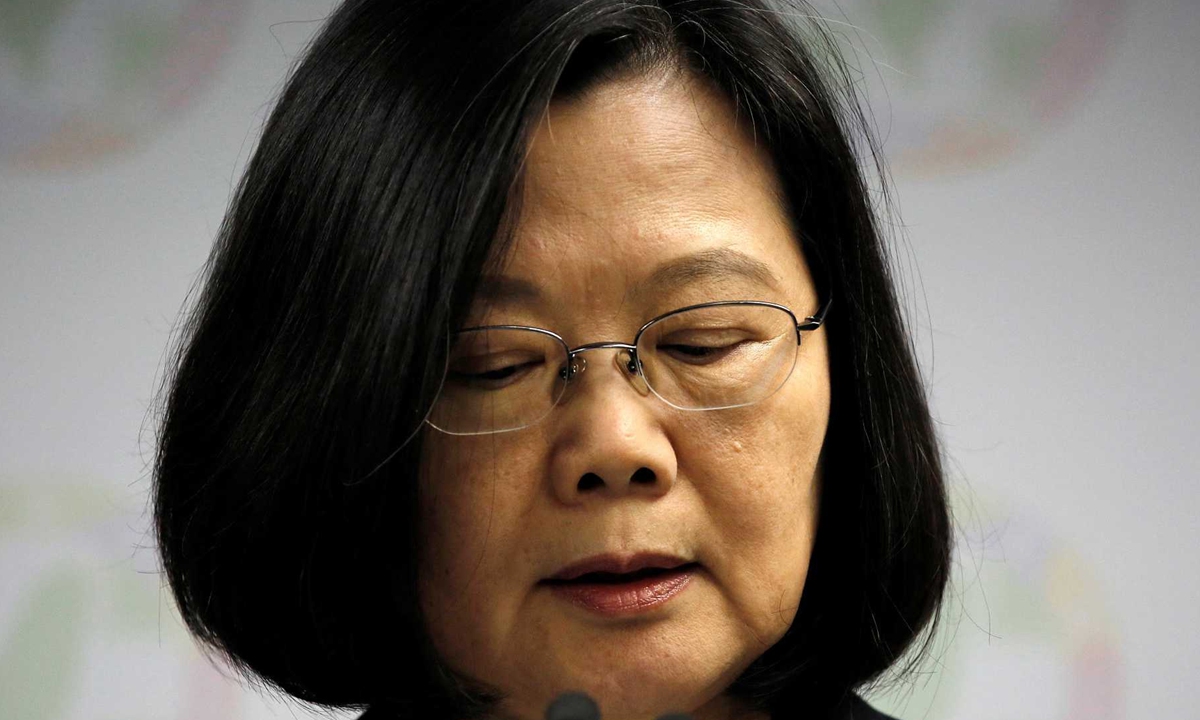
Tsai Ing-wen Photo:VCG
Taiwan on Friday cut to zero tariffs on 25 goods imported from Honduras under a free-trade agreement. The tariff cut was originally agreed in 2019. While the agreement aimed at boosting trade back then, the latest move of Taiwan against the backdrop of the current political dilemma is meant to keep the Central America country, one of its remaining 14 "diplomatic allies," to its side desperately.
Secessionist Tsai Ing-wen authorities have realized they cannot fully rely on US' verbal support to maintain their relations with its Central American "allies." After China and Nicaragua resumed diplomatic ties in December, Tsai's Democratic Progressive Party (DPP) faced enormous public pressure, prompting it to offer incentives to Honduras, whose incoming president once claimed to sever ties with the island.
For Honduras, the only benefit it can get from maintaining "diplomatic" ties with Taiwan is just some short-term economic interests and verbal support from the US. As a backyard of the US, Honduras is bound to face more than diplomatic pressure from the US. Prior to winning November's presidential election, Xiomara Castro of the leftist Liberty and Refoundation Party said that if she won she would establish diplomatic ties with the People's Republic of China. But her team changed that stance later. It is believed that the US had imposed pressure on the new government.
After Nicaragua resumed ties with China, the US Department of Treasury announced sanctions on January 10 against six Nicaraguan officials in the wake of the country's November election. The move is believed to be retaliation against Nicaragua's resumption of ties with China. But just on the same day, China and Nicaragua signed an MOU to push cooperation under the China-proposed Belt and Road Initiative. This shows the declining force of US sanctions.
The US once recalled ambassadors from Dominican Republic, El Salvador, and Panama over these countries' decision to no longer recognize Taiwan. But all the three countries insisted on following the general trend of international politics and believed establishing diplomatic ties with China is the right step on track. It can be seen that the US' influence in the Latin American region is waning, because in the eyes of regional stakeholders, the US is an unreliable leader whose commitments are all based on "America First."
But as Honduras deals with the US and Taiwan more, it will understand why Nicaragua and other regional countries made the decision to abandon Taiwan. If the new Honduras government has strategic and long-term vision, it is bound to move close to the Chinese mainland, because this benefits its national interests. Taiwan's offer of zero tariffs is only a matter of expediency to hold Honduras to its side, but will not change the trajectory of Taiwan's shrinking "allies." During Tsai's term of office, she has already lost eight "allies," which proves the lack of allure of her "dollar diplomacy" and that such "diplomacy" cannot help Tsai achieve her political goals.
It is worth noting that according to media reports, Castro has invited Tsai to attend her inauguration on January 27, but Lai Ching-te, Tsai's deputy, will be sent to attend. From Tsai's perspective, this arrangement has two calculations. For one, it happened before that Panama broke ties with Taiwan not long after Tsai's visit to the country, which was a slap on her face. Therefore, she believes a visit to Honduras will give her a boost politically but would like to avoid such embarrassment from happening to her again.
Second, internal struggles are fierce within the DPP. As contradiction between Tsai and Lai has become public, Lai did not hide his ambition that he does not simply want to be Tsai's deputy. If Panama's case happens again, Tsai can easily point an accusing finger at Lai. This proves that in managing relations with Honduras, Tsai has prioritized her political agendas rather than thinking of a long-term and mutually beneficial relationship.
After Nicaragua resumed ties with China, Taiwan has only 14 "diplomatic allies" left. Nonetheless, 14 will not be the last figure, nor will 13. The one-China principle is recognized by the international community, and Taiwan is expected to have zero "diplomatic allies."
The author is a research fellow at the Institute for Taiwan, Hong Kong and Macao Studies of the Shanghai Institutes for International Studies. opinion@globaltimes.com.cn




